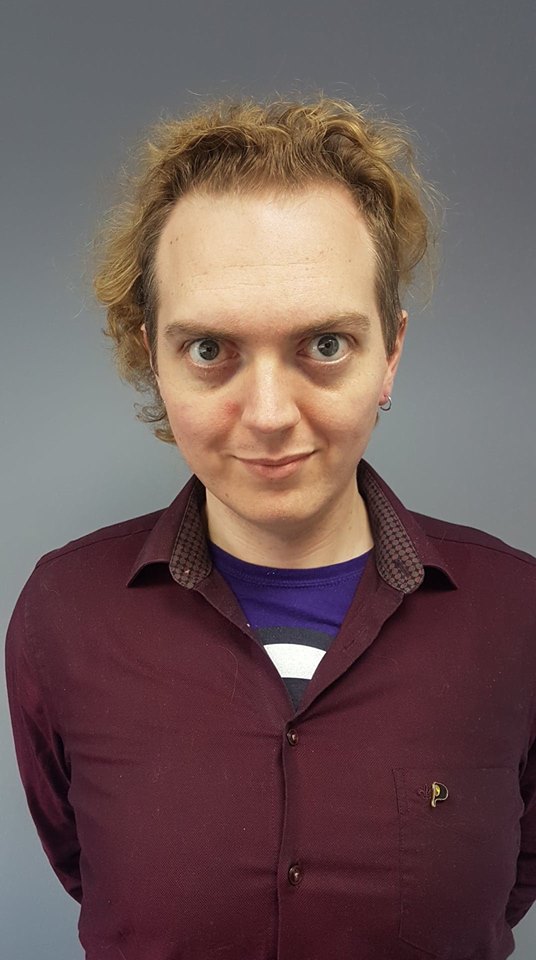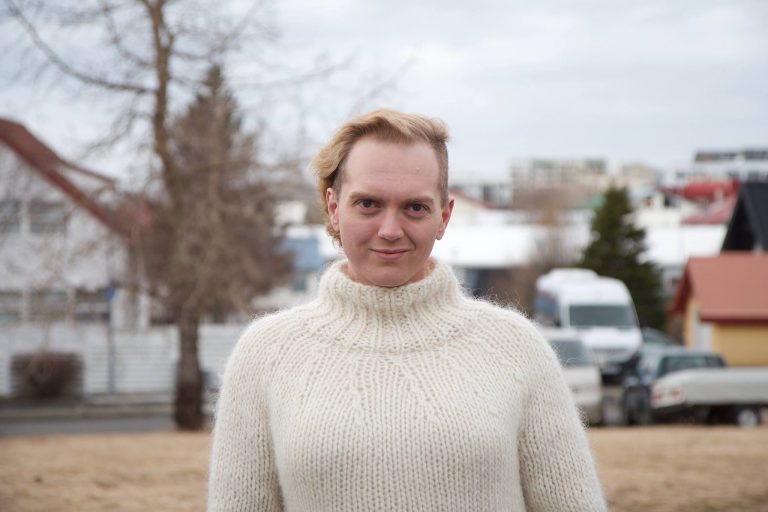Alexandra Briem is a new deputy city councillor in Reykjavík and the first trans woman to be elected for office in the city council.

She is there on behalf of the Pirate Party and says that she does not consider herself specifically a spokesperson for trans people, although she is aware that she does represent trans people outwardly and that being elected is a huge step forward in the fight for equal rights for minority groups.
“I’m excited to tackle this new role,” says Alexandra. “I’m grateful to all the people who have fought for queer rights in Iceland in the past and I realise that without their tireless efforts through the decades, this would not have been possible.”
Did you experience any hostility when you were speaking officially on behalf of the Pirate Party in the election campaign?
“No, not at all,” Alexandra says with wonder in her voice. “That’s probably the biggest surprise of this campaign. A very pleasant surprise. Of course I didn’t expect it from my fellow campaigners within the Pirate Party or from candidates from the socially progressive parties, but I was kind of surprised that no one from the parties at the furthest right or most conservative had any problems with it either. This is very encouraging and tells me that the Icelandic people don’t really consider this much of an issue anymore.”
“… no one from the parties at the furthest right or most conservative had any problems with it either. This is very encouraging and tells me that the Icelandic people don’t really consider this much of an issue anymore.”
It was unclear if Alexandra’s name would make it to the ballot as her formal name change had not gone through. The issue and therefore Alexandra got an extensive coverage. It was worked out at the last-minute – literally.
“Yes, it was a close call,” Alexandra admits. “The name change had not been registered at the national registry Registers Iceland (Þjóðskrá) and it took a lot of time to gather all the paperwork necessary to hand in to the committee that handles these matters. To make matters worse the psychiatrist who had been on the committee left in April and it had taken time to get a new one. It was not until the day we had to hand in the list of candidates that I could hand everything in to formally change the name. So there was a lot of running back and forth with paperwork that day.”
There has been a lot of discussion about this process of changing one’s name lately, and many schools have refused to call students by their right names since people in Iceland can not get a legal name change until they are 18 years old. What does Alexandra think of this process?
“We’ve talked about this in the Pirate party a lot before the election and we all agree that it is ridiculous to have a naming committee that has the authority to decide what people are allowed to call themselves. I understand that before you come of legal age there is a bit of a gray area but the Pirate Party has the policy that children and youngsters who want to take another name can register their preferred name in the system, at least as a sort of official nickname, that they are allowed to use officially in school and such.”

Another debate has been regarding the fact that there are only two options for gender in the Icelandic system is that something you would like to change?
“That is also a big issue,” Alexandra says. “Another of our policies is to make official documents officially allow for more choice for gender. The only question is how many options there should be, how nuanced it should get. The options male, female or other are a good start, but maybe we need to expand even further. The current Reykjavík city majority is in agreement with us to update city documents to accommodate a wider spectrum of gender identities.”
Alexandra has been active in politics for years, though never before in the front-line. What is it about politics that she finds so fascinating? What is her main agenda as a politician?
“My main agenda is to change the system here in Iceland, make it more transparent, democratic and open. To make it accessible to everyone. Equality regardless of gender, gender identity, ethnicity, sexual orientation or religion etc. I want a just society for everyone. After the financial crisis in 2008 the injustice and inherent unfairness of our society became so blatantly obvious that I could not keep quiet anymore.”
But you don’t consider yourself a spokesperson for the trans community in Icelandic politics?
“Of course I will always be that in some sense. I’m in politics as a trans person. But I’m aware that the trans community did not elect me as their spokesperson so I cannot designate myself their chosen representative. But who I am has, of course, made me more aware of the need to eliminate injustice against minority groups. And in that regard, my position is somewhat significant as I might well be the second or third trans person that people have seen in the media. So what I say and how I present myself does matter.”
I feel happier and more content
Our talk moves away from politics and to Alexandra’s personal life. “At the moment I’m single and childless,” she says. “But I am at the point in my life where I’m very openly considering what I want in those matters, what sort of life I want to live. For the last ten to fifteen years, while I was still trying to avoid the issue of being trans, I felt that dating was very difficult, even inherently dishonest, as I was not presenting the true version of myself to potential partners. And to me, honesty is paramount in intimate relationships. But now I’ve started looking around and thinking where I want to go from here.”
Was there a long period that you had troubles admitting to yourself who you are?
“Yes, even though I admitted it to myself ten to fifteen years ago that I was a woman I think I was hoping it would just go away if I stopped thinking about it. I was not ready to admit it to the world.”
“I’m aware that the trans community did not elect me as their spokesperson so I cannot designate myself their chosen representative. But who I am has … made me more aware of the need to eliminate injustice against minority groups.”
Alexandra started by going to a psychiatrist who specializes in trans matters in 2013, but took it slowly and it was not until 2015 that things started to move forward.
“The process was slow to start and though it’s now been three years since I started in earnest, I still have a long way to go. The surest sign that I’m on the right track is that with every step I take, every new change, I feel happier and more content. I have no doubt that as I continue my process, I will only keep feeling more at peace with myself. It was hard to find the courage to be my genuine self, but it has been absolutely worth it.”


